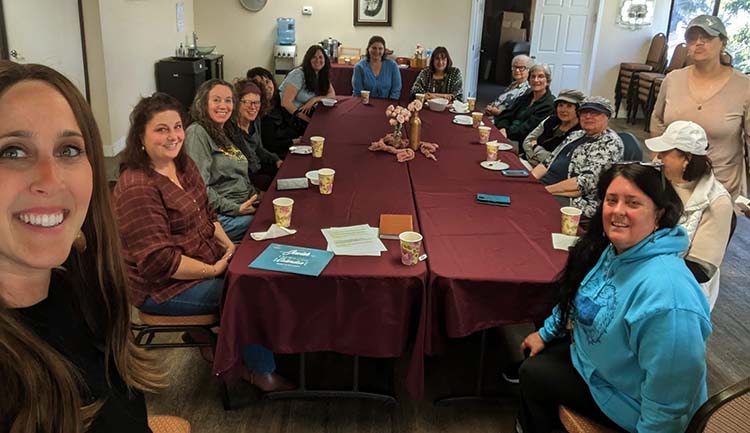
 SAN DIEGO – Celebrating survival and thriving were the key points discussed during Chabad of East County’s Jewish Women’s Circle “Torah and Tea” on Thursday, Jan. 9.
SAN DIEGO – Celebrating survival and thriving were the key points discussed during Chabad of East County’s Jewish Women’s Circle “Torah and Tea” on Thursday, Jan. 9.
Rebbetzin Chaya Andrusier discussed the Torah portion of the week, Miketz, which continues the story of Joseph. Pharaoh gave Joseph a wife, Asenath and they had two sons together: Manasseh and Ephraim.
But who were Manasseh and Ephraim? According to the Torah portion, they were very special as demonstrated by their relationship with their grandfather Jacob. Jacob formed a profound bond with them, meeting daily to study Torah together. He considered them like his own children, telling Joseph “… your two sons … they are mine. Ephraim and Manasseh shall be mine like Reuben and Simeon.” For this reason, Manasseh and Ephraim are counted in place of Joseph among the 12 Tribes.
Andrusier asked the attendees to close their eyes and listen to how Joseph’s story is relatable. Joseph loses his mother; he is despised by his brothers; sold as a slave; hounded by Potiphar’s wife and locked away for 12 years. That could have led him to a life of depression and dysfunction. Instead, he responded to his trials with unwavering positivity. Throughout his ordeal, he constantly says “Baruch Hashem (Blessed is G-d!)” We even see he was a beacon of light to those around him.
Joseph emerges from this prolonged period of turmoil unscathed. Rather than wallowing in self-pity, he rises to become a prince in Egypt. Andrusier asked, “how can a person maintain such resilience?” The answer lies in the strength and resilience derived from G-d, Joseph not only knew this truth, but lived by it, firmly believing that there are no accidents, only a divine plan.
The understanding is reflected in the name Joseph gave his eldest son, Manasseh, which means “G-d has caused me to forget all my toil and all my father’s house.” It doesn’t mean Joseph completely erased the memories of the experiences, but that G-d allowed him to set aside all his troubles and all his suffering.
Andrusier said to consider how many incredible stories of strength and resilience came out of the Holocaust. Despite facing unimaginable horrors, many survivors managed not only to function daily, but also to become extraordinary individuals.
Joseph embodies this idea. Despite the challenges, he declares, “Thank G-d, I survived, G-d allowed me to set aside and overcome my trauma.” To commemorate this survival, he named his son Manasseh.
Joseph recognized his truth, which is why he named his second son Ephraim, meaning “G-d has made me fruitful in the land of my affliction.” Not only did Joseph survive – Manasseh – but he thrived – through Ephraim.
Andrusier discussed a practical application on how we can apply this lesson to our daily lives and gave a few suggestions.
- Set goals: Instead of just trying to get by, set goals for yourself and strive to achieve them.
- Take initiative: Don’t wait for opportunities to come to you – create your own.
- Focus on the positive: Instead of dwelling on challenges, focus on the good things in your life and how you can build on them. Journal it, gratitude journal.
- Make a positive impact: Look for ways to make a positive impact on your community and the world at large.
Andrusier also discussed the childhood game of “Truth and Dare,” applying ot to everyday solutions. By embracing the spirit of Ephraim, we can strive for more than just survival. We can thrive, become fruitful, and make a positive impact on the world.
The next gathering of Chabad of East County’s Jewish Women’s Circle “Torah and Tea” will be at noon, Thursday, Feb. 6. Click here to rsvp.
*
Cailin Acosta is the assistant editor of the San Diego Jewish World.